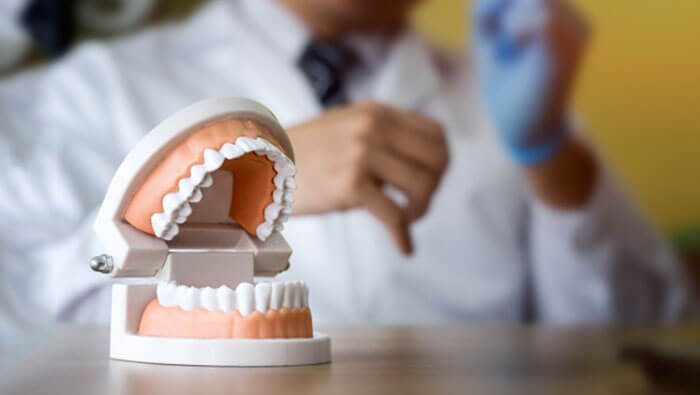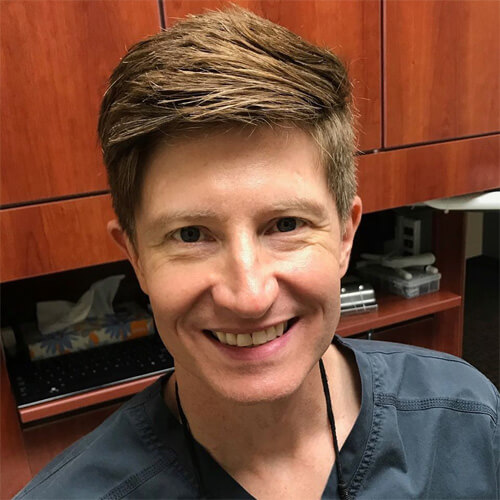When it comes to going to the dentist and taking care of our teeth properly, we often don’t think about the anatomy of the teeth we have. Other than having our wisdom teeth removed in our teen years or early 20s, or when they begin to cause us pain, do we know how many teeth we have? Do we genuinely understand the structure of this incredible part of our body? Perhaps it is finally time to count those adult teeth.
Key Takeaways
- Adults have 32 teeth, including 8 incisors, 4 canines, 8 premolars, and 12 molars (including 4 wisdom teeth).
- Baby teeth start falling out in childhood, and by adulthood, all 32 permanent teeth should have grown in.
- Wisdom teeth are commonly removed to prevent overcrowding and other oral health issues.
- Oral hygiene, including brushing twice a day for two minutes with fluoride toothpaste, is important for maintaining healthy teeth.
- Avoiding sugary drinks and practicing good oral hygiene can help prevent bad breath, gum disease, and tooth decay.
The layers of our teeth
Before we count our teeth, let’s look at the tooth itself. There are three primary layers of each tooth. The visible outer layer of each tooth is called enamel. This is the white, bright layer you love to show off when you smile. Enamel is a hard surface that protects all inner layers from the damage of decay and daily use. The enamel makes your teeth healthy, as it is the strongest tissue in the body. Dentin is the second layer, or middle layer, and makes up most of each tooth. It is most similar to bone tissue and is composed of tiny tubes that connect it to the pulp of the tooth.
The pulp is the third layer of each tooth, and it is comprised of blood and nerves. When you have tooth pain, this layer is why it feels so severe. The pulp is the innermost layer of each layer, and it is known as the “life-source” of the tooth. The crown is above the gum line, and the part of the tooth that lies below is the root. The root attaches to your jawbone. Teeth are a lot more complicated than they look.
Baby teeth and when we lose them
After teething is complete, children have 20 teeth. There are ten teeth on the bottom and ten on the top. As baby teeth begin to fall out, this is the best time for children to learn and cement healthy, lifelong oral hygiene habits so they can take care of the adult teeth that they will have after all of their teeth grow in. Without wisdom teeth, adults have 32 teeth. There are rare cases in which some adults do not lose baby teeth. In some of these cases, you can have these teeth pulled and replaced with implants or other tooth replacement solutions, or they can be left as they are. It will be discussed with your dentist as the situation arises, and generally, they are only pulled if the remaining baby teeth are causing you pain, discomfort, or disrupting the adult teeth around it.
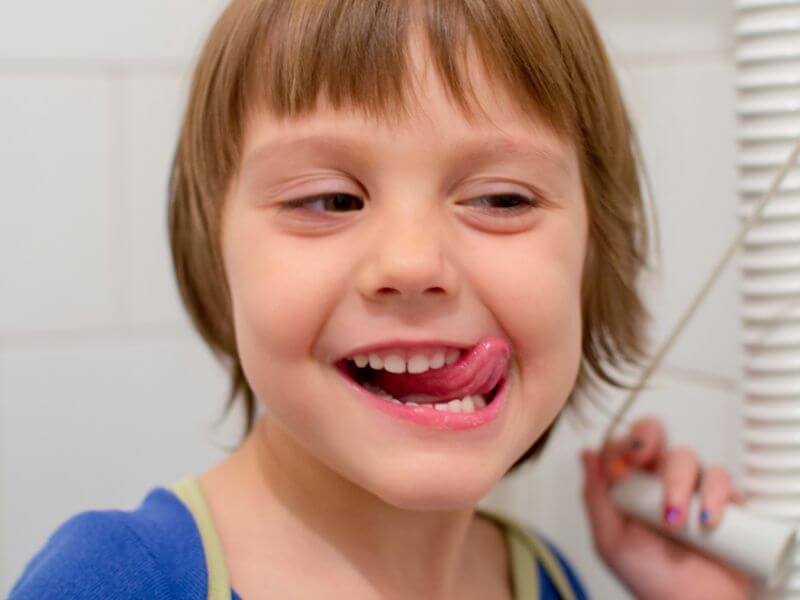
Of these 32 adult teeth, there are eight incisors, four canines, eight premolars, and 12 molars. Of the 12 molars, there are four wisdom teeth. A person will have a complete set of permanent, adult teeth by their teen years, and commonly, the four wisdom teeth are removed so the other teeth can grow in comfortably. Removing the wisdom teeth also helps to prevent misalignment of other permanent teeth.
Teeth adults have on top
Adults have both primary and secondary teeth on the top and bottom. On the top, you will see four incisors, two canines, and these “sharper” teeth are primarily for chewing food. We also have four molars on the upper half of our mouth. Like the canines and incisors, they are used for eating, and their broad surfaces are best for grinding down food so it can be swallowed safely.
Teeth adults have on bottom
Our bottom teeth are much the same, including canines, molars, and incisors, although some in higher numbers. Found on the bottom are six molars, three on each side of our mouth, two canines, one on each side, and four incisors located at the front. One type of tooth only found on the bottom of our mouth is the premolar, a tooth located between the cuspid and molar. They are physically similar to these two teeth and physically located between them. Premolars are also known as bicuspids, and they, like our canines and other “sharp” teeth, are used to tear and cut food that we eat.
Our wisdom teeth
Although we have 32 permanent teeth as adults, we have our four wisdom teeth removed to avoid overcrowding. Overcrowding can cause a variety of oral health issues in adults. If an adult does not have their wisdom teeth removed, they run the risk of increased tooth decay, misaligned teeth, impacted wisdom teeth, and an increased risk of periodontal disease. If you are in your 20s or even early 30s and know that you have not had your wisdom teeth removed, speak to your dentist about the procedure at your next appointment.
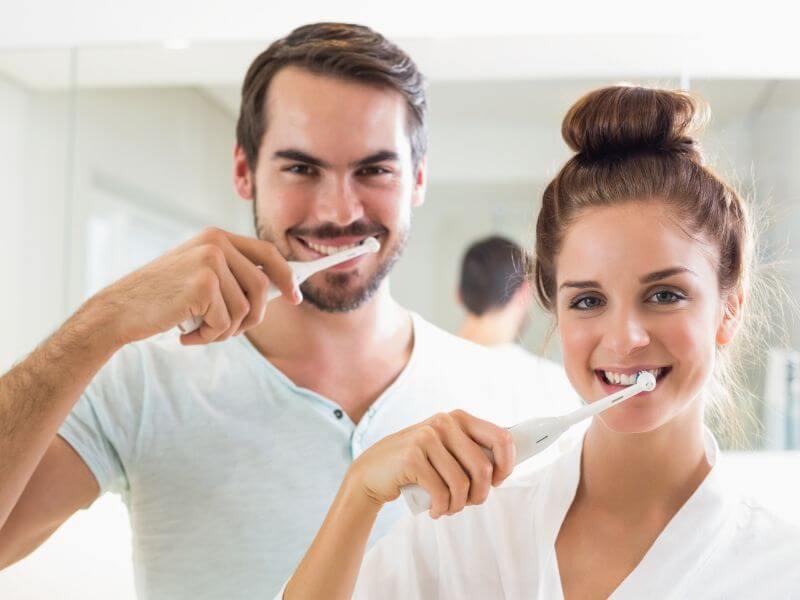
Oral hygiene is simple – but we’re forgetful
It can be pretty simple to take care of your adult teeth, although we often need reminders in our busy lives. Despite knowing how many permanent teeth adults have, we don’t always take care of them as we should. Remember to always brush your teeth gently twice a day for two minutes using a fluoride tooth place. Brushing will help to clean food and bacteria from your teeth, mouth, and tongue, and fight the icky morning breath that no one likes to have. Gum disease and the build of bacteria and tartar are significant causes of bad breath, so just this simple twice-daily routine will help keep you smelling and feeling fresh.
Avoid sugary drinks, such as soda or other sweet beverages. However, soda is not all about sugar. The acid in soft drinks, in diet soft drinks, is truly what breaks away at the strength of our adult teeth and its enamel, creates cavities and stains, and erodes teeth from the inside. It is best to limit soft drinks for your health, but if not for any other reason, do it for your adult teeth.
Taking care of our adult teeth
We have 32 adult teeth, and once our wisdom teeth are removed, 28. Brushing and flossing will keep all top and bottom incisors, canines, molars, and bicuspids looking bright and healthy. Don’t forget to visit your dentist regularly and always be honest about any dental concerns you have.
